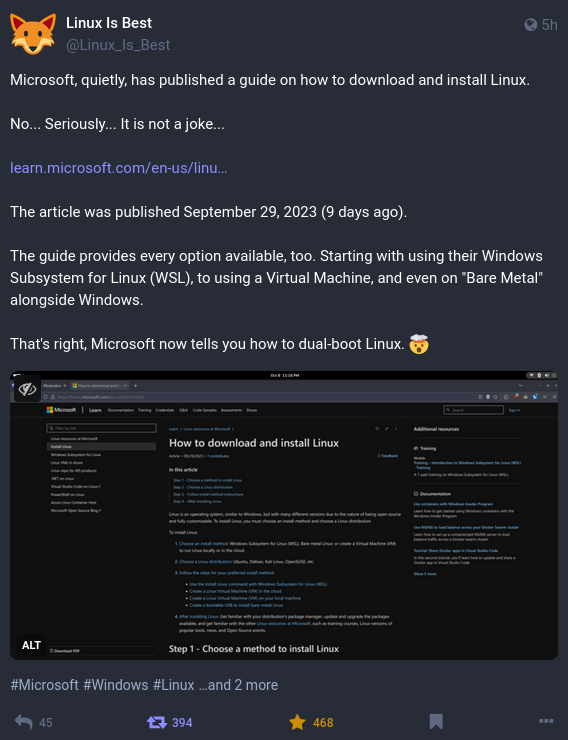this post was submitted on 09 Oct 2023
1776 points (98.2% liked)
Linux
49553 readers
977 users here now
From Wikipedia, the free encyclopedia
Linux is a family of open source Unix-like operating systems based on the Linux kernel, an operating system kernel first released on September 17, 1991 by Linus Torvalds. Linux is typically packaged in a Linux distribution (or distro for short).
Distributions include the Linux kernel and supporting system software and libraries, many of which are provided by the GNU Project. Many Linux distributions use the word "Linux" in their name, but the Free Software Foundation uses the name GNU/Linux to emphasize the importance of GNU software, causing some controversy.
Rules
- Posts must be relevant to operating systems running the Linux kernel. GNU/Linux or otherwise.
- No misinformation
- No NSFW content
- No hate speech, bigotry, etc
Related Communities
Community icon by Alpár-Etele Méder, licensed under CC BY 3.0
founded 5 years ago
MODERATORS
you are viewing a single comment's thread
view the rest of the comments
view the rest of the comments

Big Corps aren't the issue (or well they are but not because they're big corps), they only become an issue when a regular tool in their playbook is Embrace, Extend, Extinguish. See Facebook, XMPP and the effect that hostile takeover had on their recent plans to create a Fediverse platform. I agree that the Microsoft hate is overblown and unhealthy but to pretend that Microsoft engaging more in Linux is something to be enjoyed without worry is equally a bad idea. There is no guarantee they'll try to shoehorn their own bad ideas into Linux and quite frankly I think Linux is too big for them to manage that but it is a concern nonetheless.
Still at least with Linux there are plenty of other giants who have a vested interest in making sure the status quo is upheld with no single company having a monopolistic influence on the development so I don't think there's any reason to worry about the Embrace, Extend, Extinguish playbook working here at all.
I'm holding out hope (i.e. pure fantasy) that the Embrace, Extend, Extinguish playbook backfires so that Microsoft becomes just another corporation supporting what is basically another Linux distribution, called Windows, and contributing upstream. I suppose it would have to be more like what Apple did with BSD. I feel like they'd still be very able to profit this way and everyone would play together a little better. If there was enough basic and built-in on-by-default interoperability between Windows and things like ssh, NFS, filesystems, etc., many people may never bother uninstalling windows from pre-built devices like laptops that come bundled with it now.